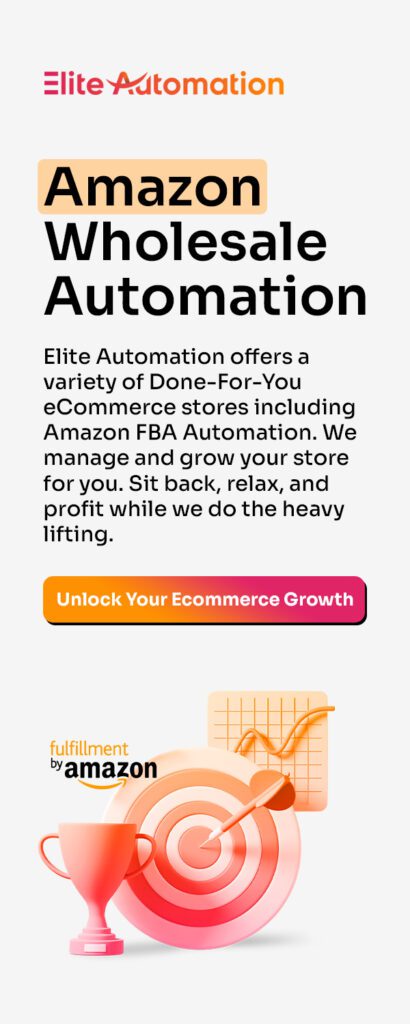In the dynamic sector of eCommerce, particularly for Amazon sellers, understanding the nuances of financing is crucial. As your business grows, the need for additional funding to scale operations, invest in inventory, or even to navigate through unexpected challenges becomes increasingly important. This article explores when and how e-commerce sellers should consider seeking external financing and the options available.
Understanding the Need for Financing
The first question that comes to mind is, “When does an Amazon seller need external financing?” The answer lies in the growth trajectory of your business. If you’re encountering any of the following scenarios, it might be time to consider external funding:
Scaling Operations: Your product is a hit, and demand is skyrocketing. To meet this demand, you need more inventory, better logistics, or even a larger team.
Seasonal Fluctuations: Many e-commerce businesses face seasonal peaks. Adequate funding ensures you can stock up in anticipation of these busy periods.
Expanding Product Lines: Diversification is key to e-commerce success. If you’re planning to introduce new products, additional funding can help cover the initial costs.
Cash Flow Management: E-commerce is often a game of timing, especially when dealing with overseas suppliers. Having the financial flexibility to manage cash flow can be a game-changer.
Options for External Financing
Once you’ve identified the need for external funding, the next step is to explore your options. Here’s a look at some of the popular financing avenues:
Traditional Bank Loans: Banks offer various loan options with varying interest rates. While they offer security, they often require extensive documentation and a longer processing time.
Online Lenders: Platforms like Kabbage or OnDeck cater specifically to the needs of e-commerce businesses, offering quick access to funds with less stringent requirements than traditional banks.
Crowdfunding: Platforms like Kickstarter or Indiegogo allow you to raise funds by pre-selling your product or offering other incentives to backers.
Venture Capital and Angel Investors: If your business has high growth potential, attracting an investor might be a viable option. This route, however, often involves giving up a portion of your business control.
Amazon Lending: Amazon offers loans to select sellers based on their sales history and performance. This can be a convenient option, given the integration with the Amazon ecosystem.
Things to Consider Before Seeking Financing
Before diving into external financing, it’s essential to consider a few key factors:
Understand the Terms: Be clear about interest rates, repayment schedules, and any other fees associated with the funding.
Determine How Much You Need: Overborrowing can lead to unnecessary debt, while underborrowing might not solve your financial needs.
Assess the Impact on Your Business: Any form of external funding should align with your business goals and growth strategy.
FAQs for ECommerce Financing
Q: What is the fastest way to secure funding for my Amazon business?
A: Online lenders often provide the quickest access to funds, with less stringent documentation requirements compared to traditional banks.
Q: Are there specific loans for Amazon FBA sellers?
A: Yes, Amazon Lending offers loans specifically for Amazon sellers based on their sales history and performance on the platform.
Q: Can new e-commerce sellers get financing?
A: Yes, though it might be more challenging. New sellers might have to look at options like crowdfunding or online lenders who cater to newer businesses.
Q: What’s the difference between a bank loan and an online lender?
A: Bank loans typically offer lower interest rates but require more documentation and have a longer approval process. Online lenders provide quicker access to funds but often at higher interest rates.
Q: How important is my credit score when applying for e-commerce financing?
A: Your credit score is crucial, especially for traditional bank loans. Online lenders may be more flexible but still consider credit history as part of their evaluation.
Q: Should I consider venture capital for my e-commerce business?
A: Venture capital can be a great source of funding for high-growth potential businesses but be prepared to give up some level of control and equity in your business.
Q: What are the risks of crowdfunding?
A: While crowdfunding can be a great way to raise funds, it comes with the pressure of delivering the promised product or rewards, which can sometimes lead to challenges if the production or development faces hurdles.
Q: How can I improve my chances of getting a bank loan?
A: Having a solid business plan, good credit history, and adequate collateral can improve your chances of securing a bank loan.
Q: Is it advisable to use personal savings for business financing?
A: While using personal savings eliminates debt, it also increases personal financial risk. It’s important to ensure that this decision aligns with your overall financial strategy.
Q: Can I use multiple sources of financing simultaneously?
A: Yes, many businesses use a combination of different financing sources to meet their needs. However, be mindful of the cumulative debt and ensure it remains manageable.
In conclusion, external financing can be a powerful tool to fuel the growth of your Amazon business. By carefully evaluating your needs, understanding the options available, and considering the impact on your business, you can make informed decisions that propel your e-commerce venture to new heights.



